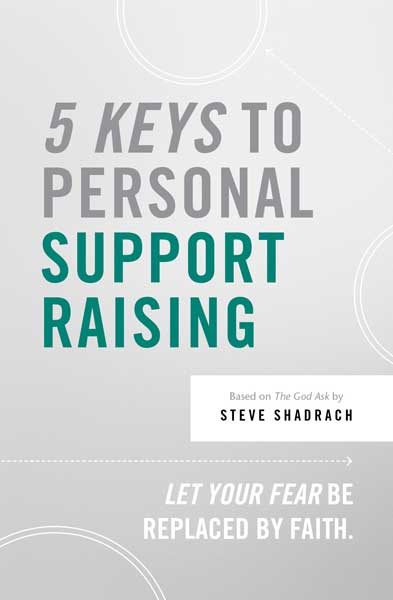
Being fully funded means more than just being at full monthly support. It also means having healthy and appropriate reserves.
Why do we need a buffer, also known as reserves?
Living paycheck to paycheck is stressful for families. Missionaries in cross-cultural and other settings face many stresses, and it’s best to avoid adding unnecessary financial stresses. Families need a buffer in their checking and savings accounts for their personal living expenses and to manage cash flow. They also need reserves with the organization in which they serve.
How much does a missionary need as a buffer?
$10,000? $20,000? It depends on each person’s situation. Singles typically have smaller support needs than families. Others can have higher costs due to a high cost of living location, high cost ministry expense, children’s education costs, medical costs, etc. Having a buffer also means that a missionary is not in immediate distress when a supporter or church has to decrease giving.
What types of reserves are needed?
Support Account reserve balance
At SIM, a missionary is required to have a positive one month reserve balance in their support account and appropriate amounts in their other reserve accounts (see below). It’s like a family that is starting on a long road trip for vacation. It’s better to start with a full tank of gas rather than the gas tank being on empty. For a missionary, having a positive one month reserve balance means if they lose support while on the field, they don’t immediately face a pay cut or have to come home early to raise more support. Instead they can draw down funds from their support account reserves.
Travel Account reserve balance
Overseas missionaries face big expenses at the end of a term. A family can easily need $5,000-$10,000 for one-way or round trip tickets. Some missionaries need reserves to cover the cost of expensive visas or travel to a neighboring country to renew their visas. Others face unexpected travel for medical emergencies or political evacuations. Having a reserve means funds are available to travel on short notice.
Home Assignment Housing reserve balance
Some missionaries living overseas have low cost of living situations. They can face a big increase in housing costs when they return to the United States for home assignment unless they have free or discounted housing. Some missionaries face two rental payment needs during home assignment, one for their home overseas, and a second one for their temporary housing needs in the U.S.
Ministry Expense Account reserve balance
Missionaries generally need funds for their day-to-day ministry expenses, fundraising, continuing education, and other allowable expenses. Holding a modest amount in reserve allows them flexibility to meet unusual or unexpected needs such as a laptop replacement or travelling to a conference without having to mount an urgent fundraising appeal.
Reserves for special one-time needs
This would cover costs such as language school, vehicle replacement, household set-up, etc.
So, how much reserves are needed?
The amount needed varies missionary by missionary. At the US office of SIM we manage funds and budgets for more than 500 family units. We review missionary fund balances (i.e. reserves) and their monthly surplus or shortfall compared to budget on a monthly basis. These reports are sorted in various ways to identify missionaries with significant support needs. Generally those with large monthly shortfalls and low reserves are those at greatest risk of facing a pay cut or not being able to continue serving long term.
Our desire is that all missionaries have a full and engaged prayer and financial support team–they are prayed for regularly, receiving full monthly support and have adequate reserve fund balances. Unfortunately, this is not always the case. SIM requires that missionaries be at full monthly support and have adequate reserve fund balances before starting a new term. In practice, this has been easier to enforce with overseas missionaries because they have a defined home assignment every two to three years. Our US based staff generally do not have a furlough or home assignment. Most permanently assigned US based staff do not face international airfares for their entire family or need a Home Assignment Housing Reserve Account. Those are a few of the reasons why US based missionaries with SIM generally have lower reserves compared to their overseas counterparts.
When an SIM missionary depletes their reserves and goes into a net deficit fund balance situation, they have a second line of protection. SIM has a pooling system that will provide temporary assistance, not to exceed one year, for an under-supported missionary.
Balance – How much is too much, and how much is too little?
We want to avoid extremes regarding reserves. When donors give, there is an expectation that their gifts will be used in a reasonable time period unless there is a special time element specified with the gift. In Matthew 25, the Lord Jesus told the parable of the talents. Jesus commended the steward who invested his talents, and condemned the steward who left his talents idle and buried in the ground. There are dangers in holding too little or too much in reserves. If we hold too much in reserves, we could put our trust in our fund balances instead of being humbly dependent on God, forgetting our need to pray “Give us this day our daily bread.” The Evangelical Council for Financial Accountability (ECFA) has defined the Seven Standards of Responsible Stewardship, including topics such as “Use of Resources,” and “Stewardship of Charitable Gifts: Giver Expectations and Intent.” In summary, we should steward gifts in a God-honoring way, and use gifts within a reasonable time period to fulfill donor intent.
Unless saving for extra-ordinary or one-time special needs, a missionary ideally needs at least three months reserves. Reserves greater than six to twelve months’ expenses are generally more than is needed. Missionaries with too little reserves should follow the model of a God-asker and seek to be fully funded with adequate reserves. Missionaries with too much in reserves should also follow the model of a God-asker and seek how to use their excess funds for the Kingdom in accordance with their local mission organization policies, ECFA guidelines, and applicable law.
Note: The views expressed in this article are those of the author and do not necessarily represent the views of SIM.

